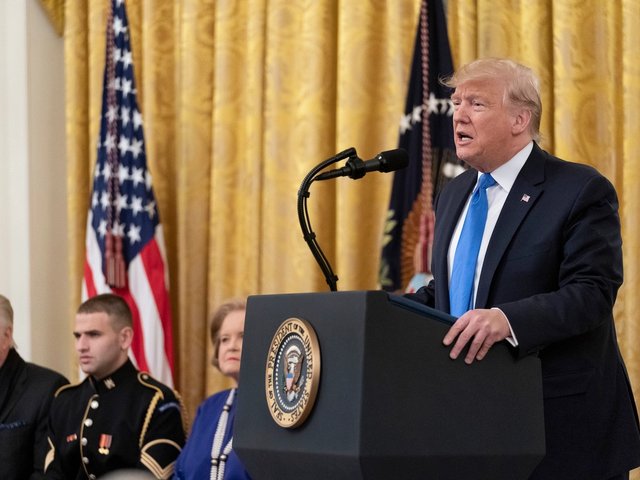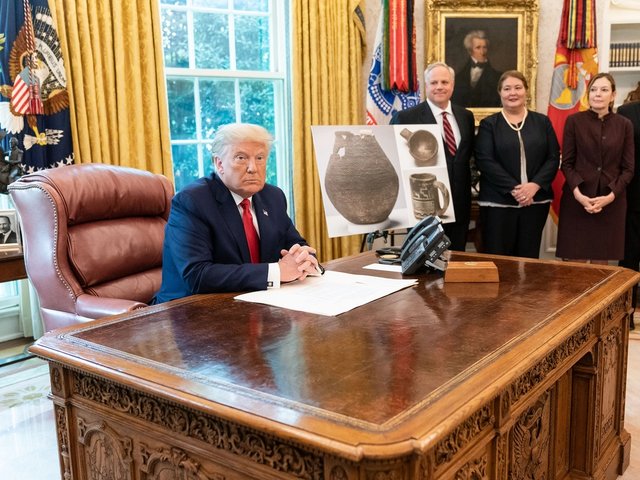Resistance to US President Donald Trump’s proposal to abolish federal agencies that provide funding to arts and humanities organisations around the country—and cuts to the agencies’ budgets, staff and mass cancellations of their grants—has begun to emerge.
On 14 April, a group of universities—including Harvard, Brown, Princeton, the Massachusetts Institute of Technology and the California Institute of Technology—filed a lawsuit against the Department of Energy as a result of cuts to federal research funding. (Three days prior, the federal agency had announced plans to reduce research funding by $405m.) On 1 May, three associations of educators—the American Council of Learned Societies, the American Historical Association and the Modern Language Association—filed their own lawsuit against the National Endowment for the Humanities (NEH), as well as the Department of Government Efficiency (Doge) to stop the dismantling of the NEH, which already has resulted in the mass firing of 65% of the agency’s staff and suspension of entire grant programmes.
In late April, the New York City-based Mellon Foundation announced that it would provide $15m in emergency funding for state humanities councils to help make up for the $65m in NEH funding that the Trump Administration has cut. Under the Mellon Foundation’s plan, each of the 50 states’ and six territories’ councils would receive $200,000 for operational support, with other funding to be made available for matching grants. That remaining funding will be administered by the Federation of State Humanities Councils (FSHC).
Phoebe Stein, the FSHC’s president, released a statement on 2 May decrying the actions of the Trump Administration, particularly the cancellation of expected government funding (“via late-night emails”) that was to be used as “reimbursement for expenses already approved and incurred”. She added: “The work of state and jurisdictional humanities councils includes programmes that help veterans heal, teach children to read skilfully and think critically, and provide grants to grassroots, volunteer-driven projects that simply would not happen without the resources of humanities councils.”
Stein’s statement echoed a larger argument that is being made in both the political and legal spheres. The lawsuit filed by the three academic associations charges the Trump administration with hollowing out the NEH, which was established in 1965 and has been consistently funded by the US Congress.
“In March 2025, Congress appropriated an additional $207m to NEH to fund its activities, the vast majority of which NEH must use on its grant programmes,” the lawsuit states. It claims that the Trump administration violated the US Constitution, since that document “grants Congress—not the President—the power to create and prescribe the duties of federal agencies, and Congress maintains the exclusive power of the purse in directing how federal funds must be spent”.
The lawsuit adds that “all of these actions were taken or directed by Doge, a body not created or authorized by statute. Doge has no lawful authority to carry out the work of another agency, let alone to dismantle it. The Supreme Court has made clear that federal agencies have no power to do anything unless given that power by Congress, and Doge has been given none.”
In the meantime, other philanthropic foundations are considering their next steps and state humanities councils are evaluating what they are able to do in their straitened circumstances. Following the Mellon Foundation’s action, the Helen Frankenthaler Foundation and the Andy Warhol Foundation are jointly allocating $800,000 to make up for cancelled National Endowment for the Arts (NEA) funding, granting 80 organisations $10,000 apiece.
Sean Buffington, the interim president of the Henry Luce Foundation, released a statement praising the actions of the Mellon Foundation, noting that the Trump administration’s actions represent “a strong challenge to philanthropy—and one we take seriously. At the Luce Foundation, we’re actively considering how best to respond and continue supporting the humanities as essential to a just and democratic society.”
Several other foundations that have financially supported arts and humanities initiatives around the US for many years—such as the Terra Foundation, Ford Foundation, Knight Foundation, the Via Art Fund and Bloomberg Philanthropies—have claimed to be monitoring the funding issues at non-profit cultural organisations and state agencies but have not announced any plans of their own to offer cash aid.
Meanwhile, state humanities councils have been looking for additional help. David Pettyjohn, the executive director of the Idaho Humanities Council, stated that the NEH last year provided $930,000 to his council, which represents 75% of its entire budget. The Idaho Humanities Council’s “grants programme would be the most affected as we solely use federal dollars”, he said. “These grants reach across the state—mostly in our rural communities—and provide critical infrastructure to local museums, libraries, and historical societies.” Funding from the Mellon Foundation, “while very welcome news, only covers about 35% of the funding we anticipated from NEH”, he added.
Jodi Graham, the executive director of the Utah Humanities, the state’s humanities agency, claimed that if the NEH were eliminated, “Utah Humanities would lose nearly $1m annually, half of our total operating budget”. The loss would be felt more severely by “some of the most rural areas in Utah”, she added, particularly in its literature programmes, such as Humanities in the Wild, Check Your Shelves and the Utah Book Award, which would be cancelled.
The same problems and concerns have been shared across the country. Eliminating NEH support puts numerous programmes at the West Virginia Humanities Council at risk, according to its executive director Eric Waggoner, which includes the West Virginia Encyclopedia Online, reference work on the state’s people, places, history, science and culture, “and the West Virginia Folklife Program, which documents West Virginia’s living traditions in music, foodways, storytelling and more”.
He noted that the state humanities council has “embarked on an aggressive outreach campaign to foundations, donors and other entities who share our values and our belief in the power of the humanities to enrich our lives both culturally and economically”. Additionally, he and others at the agency have been in contact with their state and federal elected representatives. “We have many friends among our representatives who have seen that enrichment in their home states.”







